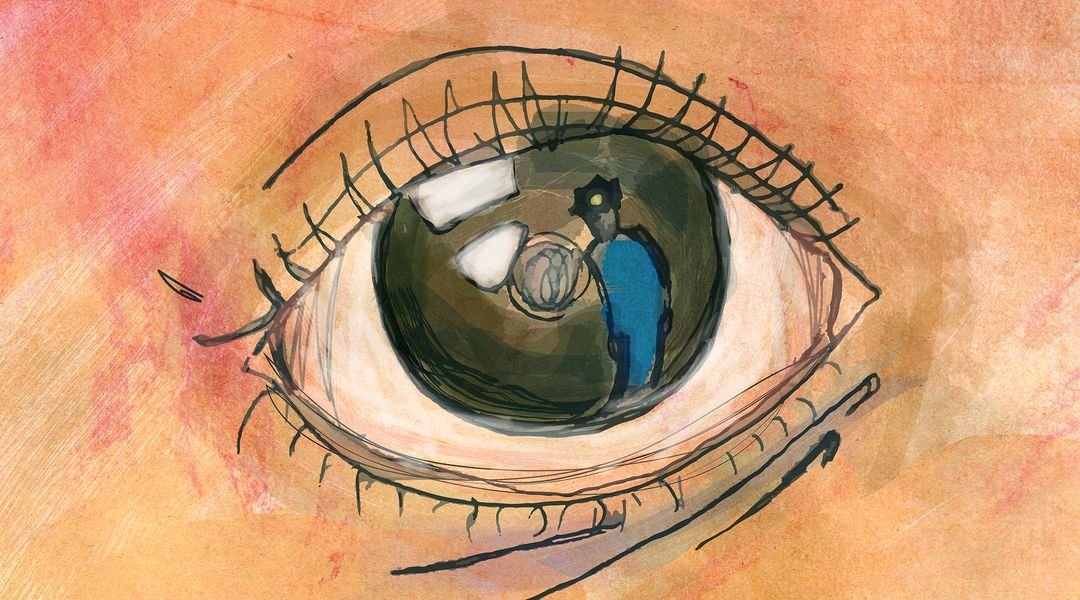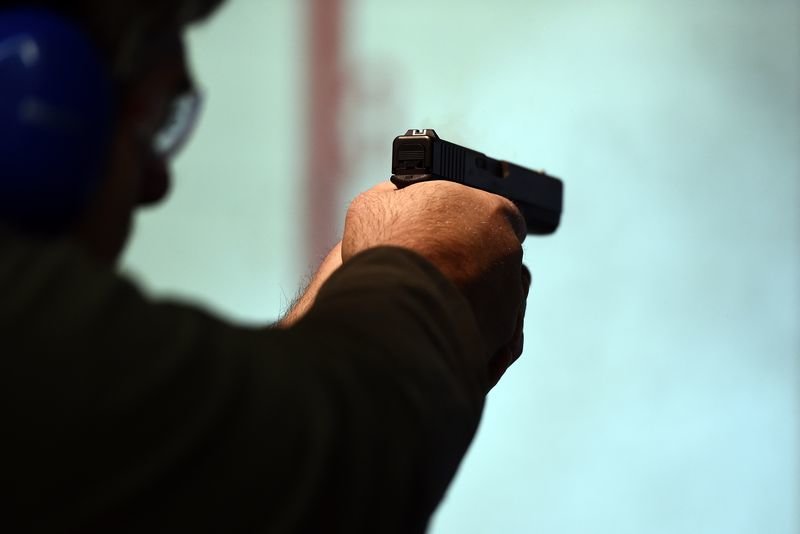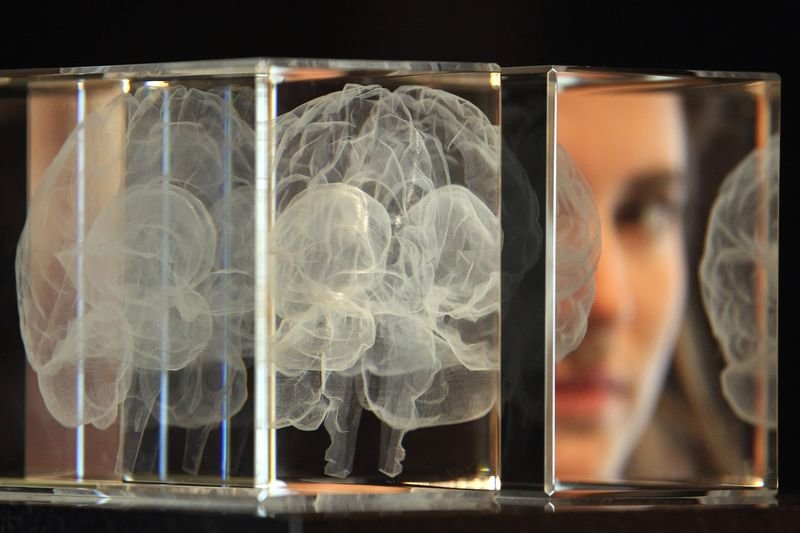Prior to the encounter, Kevin's father, Pete, called police when Kevin, now 36, acted violently on a night in 2005. Kevin refused to surrender and tried to flee, thinking police were trying to hurt him. Officers blasted him twice with a Taser, shocking him with up to 50,000 volts of electricity each time.
"I was very delusional, erratic, confrontational, and paranoid," Kevin said. "So when they came, they tased me."
It was not Kevin's first run-in with police — and it wouldn't be his last. But it's the one Kevin and his father share as one of his worst experiences.
But Kevin also knows what it's like to have a much better type of encounter — one that doesn't just resolve the current issue but also helps make sure something like it never happens again.
In Kevin's last serious encounter with police in 2006, he was staying at a safe house, where people with mental health problems could relax for a night. There, he took off his clothes — thinking it made him invisible — and walked outside.
A police officer, with training for mental health crises, approached Kevin. Kevin was scared, remembering the last time police approached him (and tased him). But this officer talked softly, reasoned with him, and, finally, convinced him to get into the car — no violence necessary.
The cop didn't take Kevin to jail — he took him to a hospital. There, Kevin got a case manager. She fended off criminal charges, got Kevin into a "housing first" program for aid, and helped him sign up into a jobs program where he learned to become a peer-to-peer support specialist.
With proper care and medication, Kevin has not had a dangerous run-in with police in the nearly 10 years since.
"He finally got the help he needed, in part because a crisis intervention team - trained officer and a case manager" treated him as a mental health patient, Pete said.
These two scenarios, law enforcement officials and advocates say, show what happens when police — and the justice system more broadly — are equipped to deal with people with mental illness: While the first encounter ended in a violent arrest that actually amplified Kevin's paranoia toward police, the second was resolved peacefully in a way that prevented potential violence in the future.
Unfortunately, the non-peaceful resolution remains horrifyingly common in America. And while this issue often shows up in the justice system, it reflects a much broader failure in US policy and society.
Police often respond to mental health crises — and shoot the patient
It's a terrifying statistic: Someone with an untreated mental illness is 16 times more likely to be killed by police than other civilians approached or stopped by law enforcement, according to a 2015 report by the Treatment Advocacy Center.
Kevin was lucky in that he was never actually shot by police. But he had several close encounters, as he and his father described to me.
One encounter began shortly after a psychotic episode that briefly landed him in an emergency room in 2002. Within 48 hours, Kevin wrapped tinfoil around his head, claiming that the CIA was reading his thoughts. He slipped out of the house and broke into a stranger's home to take a bubble bath, and eventually several officers and a police dog helped arrest him and take him into custody.
Kevin received some care after that encounter, albeit under the threat of jail time. But he eventually relapsed, leading to the encounter in which police used a stun gun to arrest him, and the final incident in which a police officer with mental health crisis training helped get Kevin longer-lasting care.
But it's troublingly easy to imagine a scenario in which Kevin's story turned out differently.
Two parents, Gregory and Sigrid Lambert in New Hampshire, told me a very different story. Police shot and killed their son, Harrison, who had borderline personality and schizoaffective disorders, in 2015, following several encounters with law enforcement.
Gregory told me the story of the final encounter:
Harrison died the following morning. The New Hampshire Union Leader reported that the shooting was deemed justified, since Harrison charged at the police while armed with a knife. The parents insist police could have used a stun gun or shot Harrison in the leg, but police argued that's not standard protocol.Harrison started having a mental breakdown, and he threatened me with a knife — two times. The second time, I was in the house, trying to blockade him from coming into my bedroom. I said that I'm going to wait until his mother comes home. [At the time, Harrison responded that he will "take care of her" when she does.] I said, well, I need to get help here.
So I made the call, per what the mental health counseling service told me to do, to call 911.
After roughly about two minutes, the police were here. I was still inside, talking to the 911 dispatcher. During that time, I heard about four shots. I ran out the door, and Harrison was laying on the ground.
"It's the most horrible thing a parent can go through," Sigrid said, her voice cracking.
The lesson, the Lamberts told me, is that they shouldn't have called the police for help. But when I asked them what else they could have done, their voices grew strained. They were clearly exasperated by the lack of good answers.
"It would have led to him breaking down the door and me defending myself. I wouldn't have killed him, but I would have knocked him right out," Gregory said. "I didn't want to go physical."
"Yeah," Sigrid responded, "but what else could you do?"
Such encounters with police aren't atypical for people with mental illness. As the National Alliance on Mental Illness (NAMI) found, each year 2 million people with serious mental illnesses are admitted to US jails.
The experiences of the Earleys and Lamberts reflect how this can happen — and how some encounters can go horribly wrong. Very often, a psychotic episode will result in someone calling the police. Depending on the circumstances of the situation — what is happening, whether someone is at risk, how the person is behaving, the cop's mood, training, and interpretation of the events — it can lead to no arrest, a peaceful arrest, or use of force to arrest or stop someone.
That's not an accident. Over the years, America has depleted the public mental health system. As a result, cops are often the first responders to mental health crises — even when they don't have the training for it.
The system responds to mental health crises only after it's too lateIf people were getting comprehensive care and support, police most likely would not need to get involved in many of the circumstances that end up in horrible tragedies. But very often in the US, that's not happening.






Thanks to Ronald Reagan for this one, all in the name of 'helping' them, were those mental clinics closed.... saving money and putting their troubles out on the street for the public to deal with directly... sort of like how the whole immigrant issue is unfolding in the EU zone... the script never seems to change.